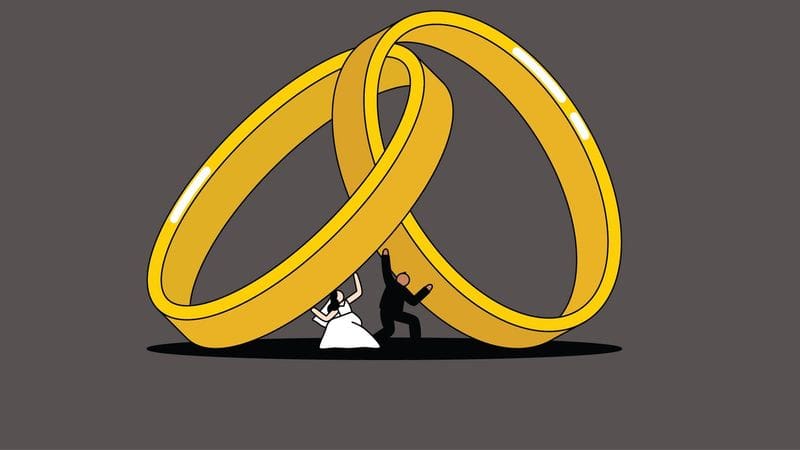Marriage has long been governed by a set of unspoken rules that many couples felt compelled to follow. However, the modern world has seen a shift in how relationships are perceived and managed. Couples today are more educated, self-aware, and open-minded than ever before.
They are realizing that many traditional marriage rules no longer fit their lifestyles or values. Instead of clinging to outdated norms, these couples are carving out their own paths to happiness and fulfillment. This shift not only reflects changes in societal values but also highlights the importance of personalization in relationships. Here are seven marriage rules that modern couples are happily saying goodbye to.
1. Always live together

Traditionally, marriage meant sharing a home. Today, some couples opt to live apart for various reasons. This arrangement can provide personal space and independence, enhancing the relationship. Living separately doesn’t mean less commitment; it can signify a mature understanding of personal needs. For some, it’s about balancing careers in different cities, while for others, it’s about maintaining their own space. This choice allows couples to cherish time together more and avoid mundane conflicts. It’s about redefining togetherness. Each couple should decide what arrangement works best, without the pressure of traditional norms. This evolution reflects broader societal changes in relationship dynamics.
2. Husband earns more

The idea that husbands should earn more than their wives is fading. In modern marriages, financial contributions are becoming more balanced. With more women holding high-paying jobs, the focus is on shared responsibilities rather than income hierarchy. This change emphasizes equality and mutual respect. Couples today value teamwork and support over traditional roles. They understand that financial dynamics can vary, and both partners can contribute in different ways. This shift allows for greater appreciation of each other’s strengths and abilities. As societal norms evolve, so do the expectations within marriage, making way for more equitable partnerships.
3. Marriage before 30

The pressure to marry before 30 is diminishing. Many couples now prioritize personal growth and career before tying the knot. This delay allows partners to mature and understand themselves better, leading to more stable relationships. Marrying later can result in more thoughtful and intentional partnerships. It reflects a change in priorities, where the focus is not on age but on readiness and compatibility. This trend supports the idea that the right time to marry is when both partners feel ready, regardless of societal expectations. It highlights a modern understanding of what makes a relationship strong and lasting.
4. Children are a must

The belief that marriage must lead to children is evolving. Many couples now choose to remain child-free for personal or financial reasons. This decision is respected as a valid lifestyle choice rather than a deviation from the norm. Couples are learning to define family on their own terms. Some find fulfillment in careers, travel, or other passions. This change represents a shift towards acknowledging diverse life paths and priorities. It highlights a more inclusive understanding of what constitutes a family, allowing couples to focus on their happiness and shared goals. Freedom from traditional expectations fosters stronger, more authentic relationships.
5. Separate finances

In the past, it was common for couples to maintain separate finances. Now, many are choosing joint accounts to streamline expenses. Shared finances can improve transparency and trust in the relationship. It encourages open communication about financial goals and spending habits. However, this doesn’t mean individuality is lost; couples often keep personal accounts for discretionary spending. The shift towards combined finances reflects an emphasis on partnership and unity. Each couple can tailor their financial approach to suit their needs. The key is to find a balance that strengthens the relationship and supports both partners’ aspirations.
6. Women change last names

The tradition of women adopting their husband’s last name is being reconsidered. Many women now choose to keep their maiden names or hyphenate. This decision often reflects a desire to maintain personal identity and professional brand. Couples are understanding that a name doesn’t define their commitment or love. This change underscores the importance of equality and respect in modern partnerships. It allows women to honor their individuality while embracing their marital status. What’s crucial is the personal choice, reflecting mutual respect and understanding. This marks a progression towards more personalized and equitable marital practices.
7. Stay married no matter what

The notion of staying married at all costs is shifting. Modern couples recognize that not all marriages are meant to last. This understanding allows for healthier endings rather than prolonged unhappiness. Divorce is seen not as failure, but as a step towards personal growth and well-being. Couples prioritize emotional health and fulfillment, acknowledging that sometimes, parting ways is the best option. This mindset promotes resilience and adaptability, encouraging individuals to seek happiness. It is about making conscious choices for the betterment of both partners. Acceptance of this change reflects a more realistic approach to relationships.

Well, hello there!
My name is Jennifer. Besides being an orthodontist, I am a mother to 3 playful boys. In this motherhood journey, I can say I will never know everything. That’s why I always strive to read a lot, and that’s why I started writing about all the smithereens I came across so that you can have everything in one place! Enjoy and stay positive; you’ve got this!

